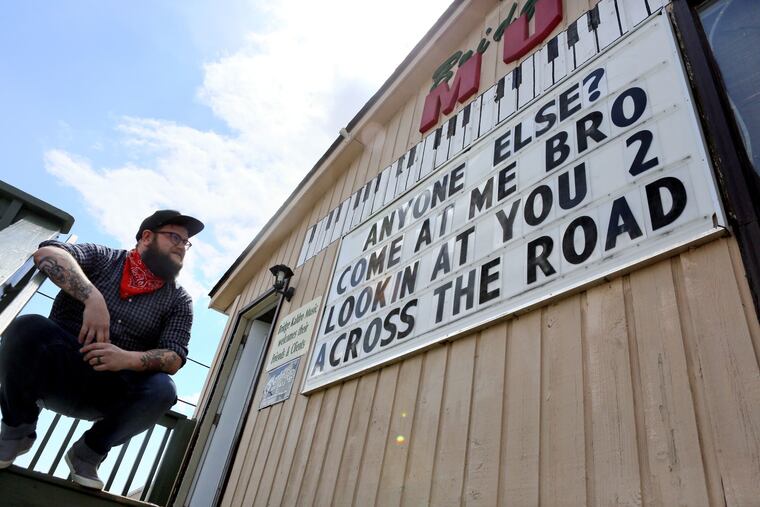How trash talking on a Virginia storefront sign led to a friendly fight across the U.S.-Canada border
As the neighbors traded gentle insults on their respective storefront signs, other businesses — from pharmacies to funeral homes, dental offices to churches — began chiming in with their own jabs.

It started with a spontaneous sign outside a music store in a Southwest Virginia town.
“Hey Super Shoes! Wanna start a sign war?” wrote Jim Bohon, a music instructor at Bridge Kaldro Music in Christiansburg, Va., on the store’s marquee on April 16.
Bohon said there wasn’t a real reason for the message other than that he wanted to stir up some fun in the town of just over 22,000 residents.
“I just thought it would be kind of cool to have a nice back and forth with the neighbors,” Bohon, 29, said, adding that the two stores have always had a friendly relationship. Still, “I honestly didn’t even know if Super Shoes was going to respond.”
Three days later, though, the shoe store next door fired back: “Hey Bridge Kaldro! Our shoe strings are stronger than your guitar strings.”
It was game on.
As the neighbors traded gentle insults on their respective storefront signs, surrounding businesses — from pharmacies to funeral homes, dental offices to churches — started chiming in with their own jabs.
“As soon as I saw them do it, I knew I was going to jump into it,” said Yoshi Koeda, who owns Kabuki Japanese Steak House directly across the street.
“You got to B-sharp to make good Shoe-shi and we won’t string you along,” Koeda wrote on the sign outside his restaurant.
Soon, “everyone across our whole city joined in. Even people who don’t have signs started printing them out and putting them up,” Koeda said.
Wisecracks and puns suddenly covered the streets of Christiansburg.
“I didn’t expect any of this,” Bohon said.
While Bohon was simply seeking some friendly competition with his store neighbor, he unintentionally sparked a sweeping sign war — not just within his own community of Christiansburg, but also in Listowel, Ontario — a tiny town in Canada with a population of about 7,500.
The cross-border combat began when Trevor Cork, owner of Speedy Glass, an auto glass shop in Listowel, caught wind of the Virginia sign war and decided to start one in his own community.
“Why not?” Cork, 37, remembers thinking to himself after he came across the Christiansburg competition on Facebook. His first target: Dairy Queen.
On April 26, he put “Hey DQ wanna have a sign war” on his business marquee. Less than 20 minutes later, he received a reply from his store neighbor: “You bet your glass we do.”
As in Christiansburg, the Listowel sign war spread rapidly throughout the town, soon spilling out into neighboring communities.
“There are thousands of signs at this point,” Cork said. After just three days, “every single business in our community had signs up.”
But the competition got really heated, he said, when a sign war was ignited not just between neighboring businesses, but between neighboring countries.
Indeed, when Koeda, who owns the Japanese restaurant in Virginia, heard a Canadian town was copying his community’s competition, “I decided to call Ontario out. I figured I could create an international sign war and start a friendly battle,” he said. “It’s going better than I even expected.”
His first sign exhibited classic Canadian stereotypes: “Canadians tryin 2 join the sign war ehh? Yall ride on elks for Uber right … bring it on Ontario!!”
Koeda soon learned, however, that his neighbors to the north do not, in fact, ride elks.
“I made that mistake and people wanted to jump in and respond,” he said.
Cork replied with: “Hey Kabuki, gloves are off. No more Mr. Rice Guy.” Dairy Queen also retorted, posting: “Hey Virginia, you may have Kabuki, but we have Suzuki eh!”
♦ ♦ ♦
The ongoing sign war between Christiansburg and Listowel has been carried out virtually over Facebook, as each town has a designated group where businesses share their signs targeting other stores, both locally and in the opposing town.
The Christiansburg group has nearly 30,000 members, and the Listowel group has close to 4,500. While there are technically no sign war winners, there are plenty of pseudo-judges on Facebook who provide commentary on each post. People have become so invested in the war that many have ventured to the towns to take selfies on the “front lines” of the sign skirmish.
“It’s amazing to see that it’s gone anywhere outside of Christiansburg, let alone across borders,” Bohon said.
Along with locals from the two communities, the sign war now has followers from more than 30 countries around the world, said Anthony Woodyard, a grief counselor at a Virginia hospice agency who started the burgeoning Christiansburg Facebook group several weeks ago.
“It’s really gained a lot of momentum,” said Woodyard, 29. “It’s just something fun and lighthearted during a time that there’s been a lot of darkness and isolation. We want to help spread positivity for as long as possible.”
Plus, he added, “this has been a free opportunity for us to market our businesses locally. I would encourage other towns to join the war.”
Koeda agreed.
Beyond giving people a reason to laugh, he said, the sign war has yielded unexpected benefits for small businesses, many of which are still reeling from the pandemic.
“It’s helped a lot,” Koeda said. “I didn’t even know some of these businesses existed, but I’m learning about them now through the sign war.”
The best part, though, is that the sign scrum has fostered a strange bond between two towns on opposite sides of the U.S.-Canada border, plus thousands of strangers around the world who are tickled by the friendly fight.
“We’re like best bud towns now, from 700 miles apart,” Koeda said. “We’ve actually been able to make some real friendships out of this.”